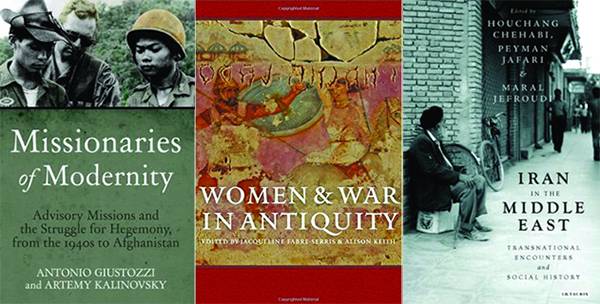
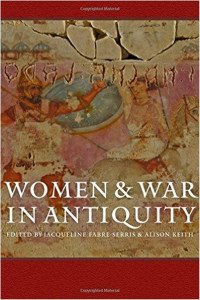
Women & War in Antiquity
Edited by Jacqueline Fabre-Serris & Alison Keith
Johns Hopkins (hardcover), 2016
PRs 6840
The martial virtues—courage, loyalty, cunning, and strength—were central to male identity in the ancient world, and antique literature is replete with depictions of men cultivating and exercising these virtues on the battlefield. In Women and War in Antiquity, sixteen scholars reexamine classical sources to uncover the complex but hitherto unexplored relationship between women and war in ancient Greece and Rome. They reveal that women played a much more active role in battle than previously assumed, embodying martial virtues in both real and mythological combat.
The essays in the collection, taken from the first meeting of the European Research Network on Gender Studies in Antiquity, approach the topic from philological, historical, and material culture perspectives. The contributors examine discussions of women and war in works that span the ancient canon, from Homer’s epics and the major tragedies in Greece to Seneca’s stoic writings in first-century Rome. They consider a vast panorama of scenes in which women are portrayed as spectators, critics, victims, causes, and beneficiaries of war.
This deft volume, which ultimately challenges the conventional scholarly opposition of standards of masculinity and femininity, will appeal to scholars and students of the classical world, European warfare, and gender studies.
Reviews
“A fascinating, intellectually stimulating, and useful volume, Women and War in Antiquity sheds important new light on a complex issue while offering penetrating interpretations at the intersection of history and literature. This excellent book should interest scholars far beyond those specializing in Greco-Roman culture.” — Kurt Raaflaub, Brown University, coeditor of Raymond Westbrook’s Ex Oriente Lex: Near Eastern Influences on Ancient Greek and Roman Law
“The essays in this volume open up important but neglected topics for further inquiry, and will be valuable for literary and military historians alike. In addition, the international perspectives represented will challenge scholars to venture beyond traditional interpretations and methodologies, especially regarding the study of gender in antiquity.” — Bryn Mawr Classical Review
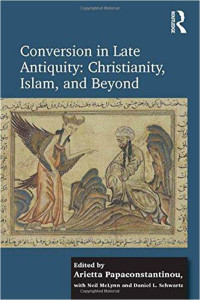
Conversation in Late Antiquity: Christianity, Islam, and Beyond
Edited by Arietta Papaconstantinou
Ashgate (hardcover), 2016
PRs 14380
The papers in this volume were presented at a Mellon-Sawyer Seminar held at the University of Oxford in 2009-2010, which sought to investigate side by side the two important movements of conversion that frame late antiquity: to Christianity at its start, and to Islam at the other end. Challenging the opposition between the two stereotypes of Islamic conversion as an intrinsically violent process, and Christian conversion as a fundamentally spiritual one, the papers seek to isolate the behaviours and circumstances that made conversion both such a common and such a contested phenomenon. The spread of Buddhism in Asia in broadly the same period serves as an external comparator that was not caught in the net of the Abrahamic religions. The volume is organised around several themes, reflecting the concerns of the initial project with the articulation between norm and practice, the role of authorities and institutions, and the social and individual fluidity on the ground. Debates, discussions, and the expression of norms and principles about conversion conversion are not rare in societies experiencing religious change, and the first section of the book examines some of the main issues brought up by surviving sources. This is followed by three sections examining different aspects of how those principles were - or were not - put into practice: how conversion was handled by the state, how it was continuously redefined by individual ambivalence and cultural fluidity, and how it was enshrined through different forms of institutionalization. Finally, a topographical coda examines the effects of religious change on the iconic holy city of Jerusalem.
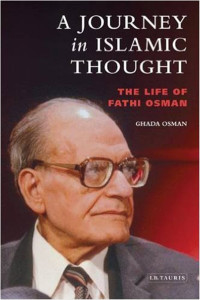
A Journey in Islamic Thought: The Life of
Fathi Osman
Ghada Osman
IB Tauris (hardcover), 2016
PRs 6650
From pre-revolutionary Egypt to the Muslim Brotherhood, and from imprisonment to exile, this is the life of Fathi Osman: a leading Egyptian-born thinker at the forefront of modern Islamic reformism for nearly four decades. Joining the Muslim Brotherhood as a young man, Fathi Osman rose through the ranks of the organization thanks to his own considerable skills in oratory and his relationship with leading Brotherhood figures, Sayyid Qutb and Hasan al-Hudaybi. But as he began to recognise the covert violent aspects of the Brotherhood, he increasingly distanced himself and voiced his opposition. He was, due to his association with the Muslim Brothers, imprisoned a number of times before he eventually left Egypt in self-imposed exile. Using interviews, family documents and archival materials to chronicle Fathi Osman’s ideological development from spokesperson for the prototypical Islamist movement to formulator of a radical Islamic reformist ideology, Ghada Osman sheds light on the lure and inner workings of a major Islamist movement and the role of Islamic reform in the global arena.
In the process she has produced a dispassionate and thoroughly researched biography of a major figure of the twentieth-century Arab and Muslim intellectual world.
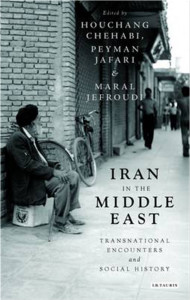
Iran in the Middle East: Transnational Encounters and Social History
Edited by H.E. Chehabi, Peyman Jafari and Maral Jefroudi
IB Tauris (hardcover), 2016
PRs 12400
Iran s interaction with its neighbours is a topic of wide interest. But while many historical studies of the country concentrate purely on political events and high-profile actors, this book takes the opposite approach: writing history from below, it instead focuses on the role of everyday lives. Modern Iranian historiography has been dominated by ideas of nationalism, modernization, religion, autocracy, revolution and war. Iran in the Middle East adds new dimensions to the study of four crucial areas of Iranian history: the events and impact of the Constitutional Revolution, Iran s transnational connections, the social history of Iran and developments in historiography. Featuring eminent scholars such as Ali Ansari, Janet Afary and Erik-Jan Zurcher, this book makes a significant contribution to the understanding of Iran in a transnational context by exploring the key social actors in the constitutional revolution, trade and the role of women. The authors emphasize the role of societal transformations, social movements, class, gender and ethnic identities, analyzing both national and individual identity. What emerges is a concise and unique look at Iranian social history, from both within the country s internal relationships with its social groups, and from its external relations with neighbouring countries. It will prove essential reading to scholars and students of Iran and the wider Middle East region.”
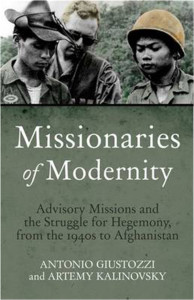
Missionaries of Modernity:
Advisory Missions and the Struggle for Hegemony in Afghanistan and Beyond
Antonio Giustozzi and Artemy Kalinovsky
Hurst (hardcover), 2016
PRs 8990
This volume is an historical survey of advisory and mentoring missions from the 1940s onwards, starting from the Soviet missions to the Kuomintang and ending with the mission to Iraq. It focuses on Afghanistan during the Soviet occupation and after 2001, but also deals with virtually every single advisory mission from the 1940s onwards, whether involving ‘Eastern Bloc’ countries or Western ones. The sections on Afghanistan are based on new research, while the sections covering other cases of advisory/mentoring missions are based on the existing literature. The authors highlight how large-scale missions have been particularly problematic, causing friction with the hosts and sometimes even undermining their legitimacy. Small missions staffed by more carefully selected cadres appear instead to have produced better results. Overall, the political context may well have been a more important factor in determining success or failure rather than aspects such as cultural misunderstandings.

